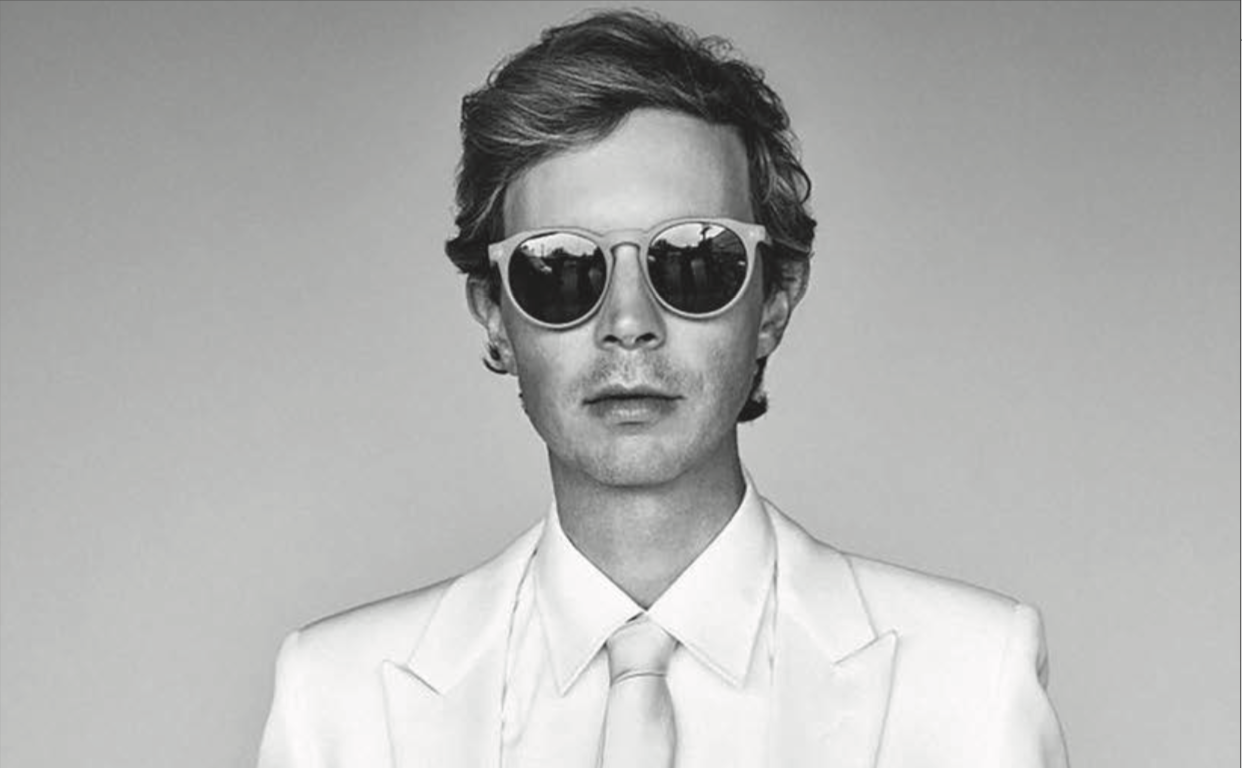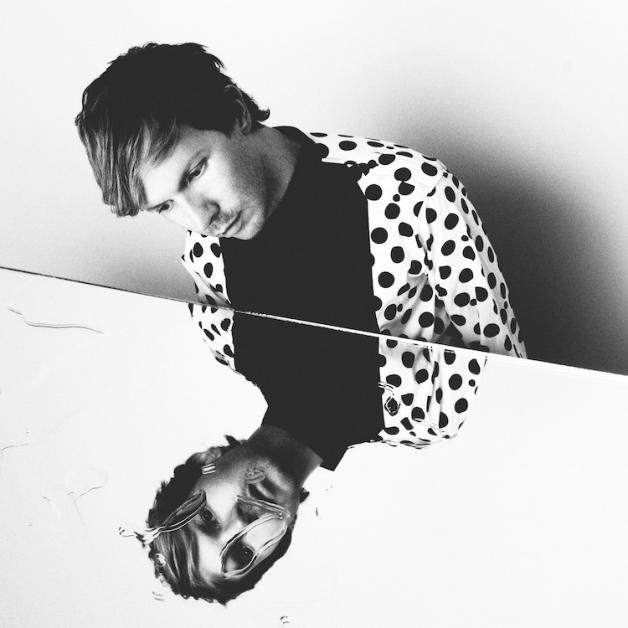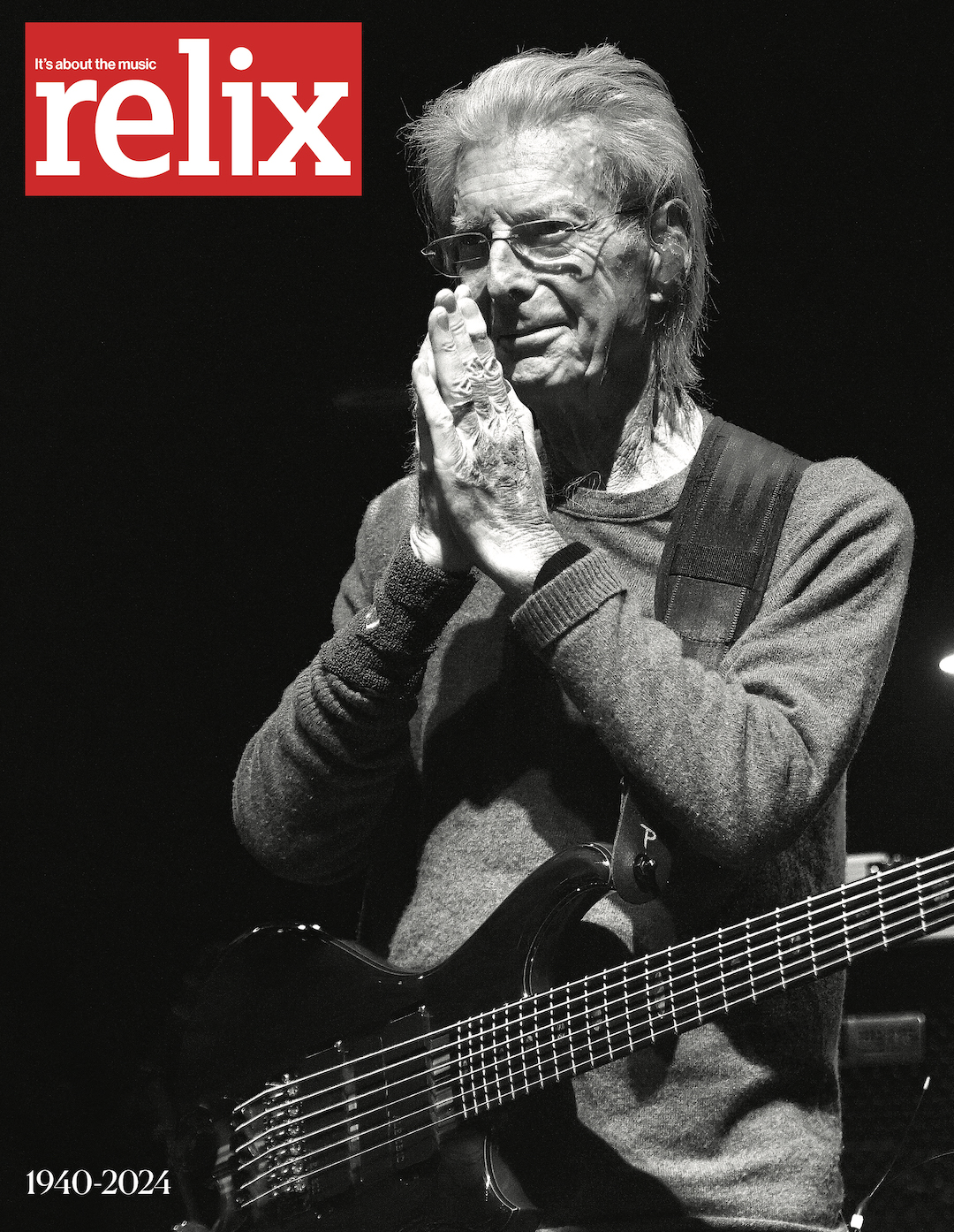Beck: Deep Hues
 Lauren Dukoff
Lauren Dukoff
Beck Hansen had a pretty clear creative MO this year—work relentlessly hard to make effortless-sounding music.
“I was trying to write very simply in a sort of classic approach,” he says of his 13th LP, the neon-tinted Colors. “This sort of blueprint of The Beatles and Michael Jackson and the great, simple pop music. Ultimately, I kind of went halfway between that and what I do—I found a middle ground. But I wanted to challenge myself to be simple. And it’s really hard. It’s hard to have it feel personal and direct without being trite and clichéd.”
The genre-hopping singer-songwriter/studio rat spent roughly four years toiling over the project, obsessing endlessly over an ever-expanding batch of material with frequent collaborator Greg Kurstin (now a mega-pop producer for Sia, Kelly Clarkson and Adele). In a given week, the duo might rework one song dozens of times, splinter off the chorus into a new track, then scrap the whole arrangement and start fresh after landing on an exciting lyric or keyboard patch. One of their breakthrough moments was stumbling on a “pretty cheesy” retro pan-flute synth tone, which highlights the electro-pop blitz of both “Wow” and the title track.
“It was similar to how, in the ‘90s, I would say, ‘Hey, let’s do a fuzz guitar’—one of those thin ‘60s guitar sounds,” he continues. “But that was not a cool guitar sound! It was the whole era of post-hair-metal/ grunge. I was like, ‘Let’s use the littlest, pinky-dink fuzz sound.’ I got this old, vintage guitar pedal, the Fuzz Phase, and was like, ‘That’s the sound!’ It’s something you’d hear in 1966 in a bad spy movie or something. That felt so far out from what people were trying to do at that moment that it felt exciting. Somebody has to recontextualize, and [Justin] Bieber was able to do that on the flute [on ‘What Do You Mean?’].”
It’s slightly bizarre to hear Beck—the man who once scoffed in song, “MTV Makes Me Want to Smoke Crack”—casually suggest that the world’s biggest pop star beat him to a creative punch. But it’s emblematic of the journeyman’s musical headspace these days. Everyone has their own favorite Beck mutation: the post-grunge rap-folk renegade of Mellow Gold and Odelay, the campy funk-rock buffoon of Midnite Vultures, the forlorn singer-songwriter of Sea Change and Morning Phase. But the visceral thrill of Beck fandom is following him through these stylistic twists, never knowing which side of his split personality will crash the party. Now, after two-and-a-half decades of subverting expectations, he’s taken his most daring creative leap—making his most linear, accessible music to date.
With Colors, Beck set out to craft his version of a career-defining legacy album—a collection of note-perfect, immaculately sculpted pop songs without any awkward vocal takes or lackluster mixes. “I wanted to have one of those records where I knew I pushed as hard as possible,” he says. “Every artist has that one record where they poured everything they had into it. It doesn’t necessarily mean it’s the best record, but it’s the record where you know they went as far as they could in the writing and production—The Beatles’ Sgt. Pepper’s, The Beach Boys’ Pet Sounds, Michael Jackson’s Thriller, Peter Gabriel’s So, Paul Simon’s Graceland—something meticulously thought out and worked on. I wanted to do something like that. With a lot of my records, I’ll just make music and listen for things that have a little bit of a spark. A lot of times, I’ll end up using the
Kurstin, with his jaw-dropping pop pedigree, was the perfect sounding board and co- writer. They’ve also been close friends and collaborators for well over a decade: He joined Beck as the live keyboardist on his 2002 Sea Change tour, and he later recorded numerous overdubs on 2006’s The Information and 2008’s Modern Guilt, not to mention loads of unreleased music.
“We kept playing together but, at that point, I hadn’t put out a record in about five years,” Beck says of their partnership. “I’d created this whole body of songs on my own for a number of years, and I wanted a fresh start, so I shelved all that music and felt like, ‘Maybe I’ll get back to this later.’ It was a much more experimental body of work. Greg and I always enjoy working together, but it’s usually with another producer in the room, like Nigel Godrich or Danger Mouse or The Dust Brothers. So it was almost like the kids were left to their own devices.”
Throughout the recording process, Beck had a front-row view of Kurstin’s own career explosion. “I was in the room with him when he got the call that his song [‘Hello,’ which he co-wrote and produced] got on the Adele record and was gonna be the first single,” he says. “It was one of those moments. I remember telling him: ‘Your life just changed.’”
Despite the obvious camaraderie, their process involved a lot of trial and error, as they holed up in the studio and performed many of the instruments themselves, aiming for optimism and verve after the dour mood of Beck’s last LP, Morning Phase. “I consciously had much darker lyrics originally,” he says of his new direction. “But I was trying, with Greg’s help, to stay away from the heavier lyrics and make something that was a little more uplifting. That was the real goal of the record.”
He succeeded. These are Beck’s hookiest, most user-friendly songs to date— perfectly suited to surge out of arena speakers and across festival grounds. Take the falsetto-laden electro-rock of “I’m So Free” and “Dreams,” or the Lennon/McCartney-esque stomp of “Dear Life,” which sounds like a modernized “Lady Madonna” with a fuzz-guitar solo that’s somehow catchier than the vocals. Even the solitary ballad, the pensive “Fix Me,” is layered with luminous glockenspiel and piano.
Thematically, Beck says, the album may have struck more of a cultural nerve if he had released it two years ago, back before the 2016 Presidential Election and the residual worldwide paranoia from the Trump presidency divided the American populace into packs of rabid wolves. Colors offers a medicinal power; instead of holding up a mirror of hope, it’s a soothing distraction.
“I was in the studio with Pharrell when he was just finishing up [his ubiquitous 2013 hit] ‘Happy,’” he says. “He played it for me when it was in progress. If that song came out now, you might say the same thing about it. We were working on our records at the same time, and I was also feeling this message of brightness and hopefulness.
“We were going to put out the album last fall, but it felt like things were heating up in the culture and in politics,” he continues. “I felt like it was a bad time, so we held it back another year, which was probably a good idea. I think if it had come out when it was supposed to, it would have gotten lost in the shuffle. People’s thoughts and attentions were elsewhere, and I try to be sensitive of that kind of thing. I don’t think I anticipated, when we were doing the songs, that we’d be in this different era, but here we are. [Similarly], I had all the songs and was ready to record Sea Change, and we were gearing up for it, and then 9/11 happened. So it just felt like the right time to step away for a year and come back to it. With this record, it was also smart to step back.”
Releasing the album earlier may have been a smarter commercial move—a case of striking while the iron was sizzling hot—but Colors still arrives at an important juncture in Beck’s career. Sure, he’s been a critical darling and massive tour attraction since redefining alt-rock in the early-‘90s. But he’s currently riding an unexpected wave of renewed mainstream exposure after Morning Phase won Album of the Year at the 2015 Grammys. (During Beck’s dazed acceptance speech, Kanye West created a viral-worthy moment by pretending to bum-rush the stage—a reference to the rapper’s notorious 2009 VMAs incident, in which he grabbed Taylor Swift’s Best Female Video trophy and ranted about how Beyoncé was robbed for the award. Notably, in a post- Grammys interview, West protested that Beck “[needed] to respect artistry” and “should have given his award to Beyoncé.”)
“I had so much going on,” he says of his Morning Phase hot streak. “I’ve been touring. We got all these offers after we finished the last album cycle. After the Grammys, so many things happened. I was doing benefits and playing at [Lou Reed’s] Rock and Roll Hall of Fame [induction ceremony]. I got all kinds of festival offers, so things got really busy. That became the more important thing to do than finish the record.”
 Eliot Lee Hazel
Eliot Lee Hazel
Fans have known for years that this album existed—at least in some form. In 2013, Rolling Stone reported that Beck was working on two LPs—the “acoustic” release that ultimately became Morning Phase and another set described by an insider source as the “proper follow-up to Modern Guilt.” As the months passed without any news of this mysterious companion record, Colors seemed destined to collect digital dust on a hard drive somewhere, among his scores of other unreleased LPs.
“For most of my records, there’s another album or two of [unreleased] stuff,” he says. “I just don’t release all of it. I’m a little more picky. Before I made Odelay, I did two or three kinds of records. I did something that was a bit more acoustic and somber—my attempt at a Big Star, singer-songwriter ‘70s thing. I did another that was very guitar-based, very indie-rock, influenced by the music of that time: Pavement, Sebadoh, Guided by Voices.”
You wouldn’t think that free-for-all recording rule would apply to Morning Phase, considering that Colors was already starting to take shape at the same time. You’d be wrong. “There’s a whole bunch of Nashville country songs that I’d recorded originally,” he says. “There’s another record of stuff that sounds kind of bucolic and folky and has a little more energy—more strummy. But when I started getting songs like ‘Morning’ and put it together with ‘Wave’ and ‘Waking Light,’ I decided, ‘I don’t want to put that other stuff in here. There’s something happening with this new stuff.’ Maybe some of those other songs will see the light of day. Maybe the world doesn’t need to hear it.”
Regardless, Beck is sitting on a potential goldmine of unreleased material. Around 10 years ago, he went hunting through his massive archive and was shocked to discover that much of his unused material was more or less professional quality. “I thought some of them were demos, but I realized, ‘Wow, this is mixed!’” he says, laughing. “I started remembering, ‘We worked really hard on this! This is a record!’”
But Beck is willing to scrap an album or two if it isn’t hitting his often blurry bull’s-eye. “I can go back to Odelay and Guero, and there are versions of those songs where the vocals are sung perfectly on a much better microphone—clearer, more forward,” he says. “But there was something about the crappy-sounding mic and the first take where I wasn’t trying to nail it. And we just left it. There are many memories from the ‘90s where I’d be recording a vocal and we’d all decide it was too poppy or too slick. Was that a good decision or bad? I don’t know. We were going for something with more character rather than something that’s like a laser shooting out of the speakers.”
Colors, on the other hand, is one laser after another. It’s a fucking Death Star. Beck and Kurstin powered through numerous songs before arriving at their final 10, but this “demolition derby” approach was also a bit different than usual. “It’s a messy process,” he admits. “With this record, each song was a dozen songs before we got to the final version. It’s almost like each track is the greatest hits of all the ideas we wrote for that particular song. It’s an interesting process. It was a discipline, but it was also liberating because it felt like nothing was precious. You could erase the chalkboard and start over. It was very freeing.”
“Over the years, I’ve started to feel that people can hear if it’s effortless,” he continues. “So there is probably some wisdom to the approach to go with the things that you don’t struggle with. But I grew up with this myth: I remember getting a Japanese bootleg in the early ‘90s of The Beatles’ sessions for ‘Strawberry Fields Forever’ and some of the Sgt. Pepper’s tracks. They were really struggling and tried 50 different versions. They didn’t come up with this magical thing out of thin air. They explored and struggled and fought for it. There was a lot of legend around Pet Sounds growing up. You’d hear about Rumours or Thriller where they just pushed and pushed and were meticulous. Like Steely Dan [on 1977’s ‘Peg’], where they got five guitar players to play the same solo, just to get that magical moment. That was very influential for me—the process of not being afraid to struggle a bit and possibly come up empty-handed after all the effort.”
That process—digging deep, polishing, perfecting—defines Beck’s ethos in 2017.
“I’ve been in a mode in recent years where I want to hear something or see something that feels like a lot went into it,” he says. “I suppose it’s from the feeling that we live in a world where the computer programs used to make music, film or art allow you to do magical things with the press of a button, and not a lot of effort. What was a miracle 25 years ago is now kind of commonplace in music production. So I want to hear something that doesn’t sound like I could have thrown it together on my laptop. If it’s a painting, not some free-form, abstract composition, I want something that looks like it took two years to paint with meticulous detail and complexity. That’s just what I’ve been drawn to recently.
“We’re in a period now where, suddenly, a lot of art-making and filmmaking is little bit facile,” he adds. “You can press a button and make it look like there’s some kind of incredible special effect. If I were a filmmaker right now, I’d be trying to make something like [director/ choreographer] Busby Berkeley. If I were a Wes Anderson or Spike Jonze—one of my contemporaries—I’d be trying to make something elaborate, choreographed, set- designed, meticulously built, with camera work that couldn’t be done with computer- generated imagery.”
Beck’s artistic objectives are in constant flux. It’s hard to believe that the same man recorded both the warped lo-fi folk-noise of 1994’s One Foot in the Grave and the glimmering post-modern pop of Colors, or that the smiling, grateful gent at the 2015 Grammys once sarcastically deadpanned on MTV that earning the breakout success of “Loser” was “like surfing in some oil spillage.” But looking back, he can draw a straight line through these zig-zagging career shifts.
“I’ll occasionally see an old photo of me and the guys in my band and think, ‘Whoa, we look different,’” he says. “But the way it feels, subjectively, is very close. It almost feels like that restaurant that closed 10 years ago is there. It feels like I could get in my car and go there. That’s what a lot of my past feels like. It feels like I could reach out and touch it. It doesn’t feel like some foggy, distant place.
“For me, it’s always been about creativity,” he sums up. “I was making music for at least five or six years before I had anybody interested in recording me. And I’ve sort of wondered what that alternate version of my life would have been like [without commercial success]—if there weren’t the distractions of having to go on big tours and put bands together and do TV shows and travel all over the place. I would probably be off making art, exploring. I do think about that. Occasionally, I’ll be at an art show or reading an article, and I’ll remember that some of the great artists in history were unknown in their lifetimes. In their modest existence, they created a whole world. It got deeper and deeper, and richer and richer.”
This article originally appeared in the January/February issue of Relix.



















